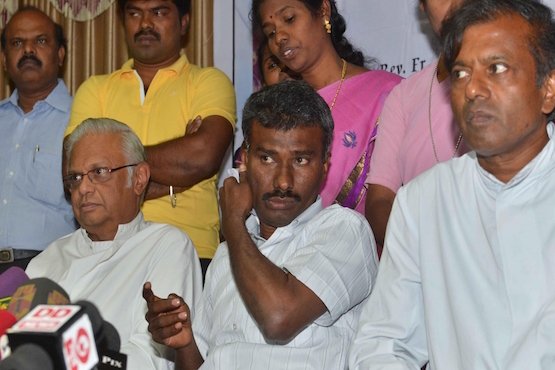Jesuits commit to build peace in South Asia
South Asia region is struggling against economic inequalities, caste discrimination and cultural hegemony

A file picture of Indian Jesuit Father Alexis Premkumar, (center) who spent eight months as a prisoner of the Taliban in Afghanistan, addressing a press conference in Chennai soon after his release and arrival in India. (Photo by IANS)
Jesuits in South Asia have announced a set of strategies to combat poverty, discrimination and religious extremism.
Father George Pattery, Jesuit provincial of South Asia, said in written statement that regional superiors had specifically vowed to respond effectively, through their ministries, to an alarming rise of fundamentalism within the region.
The Jesuit statement, being circulated among Catholic groups, outlines strategies to build just societies based on principles of liberty, equality and fraternity.
The South Asia region is struggling against economic inequalities, caste discrimination and cultural hegemony.
In India, nationalist groups are trying to establish a monolithic Hindu culture.
Sectarian bias had emerged in the functioning of India's police, investigative agencies, prosecutors and lower level courts, the statement said.
The primary strategy being adopted by the Jesuits is to educate people against adopting "hate" ideologies and to provide a counter narrative, including through films and documentaries.
The Jesuits said "socio-cultural analysis" should be urgently integrated into all church educational and media institutions.
There is a need to highlight the importance of Constitutional protection of religious freedoms and to contrast this with divisive, sectarian agendas.
Jesuit social ministries should collaborate with local government and law enforcement agencies to promote peace and reconciliation among communities at the grassroots, the Jesuit statement said.
The announced Jesuit strategy comes in the wake of attacks on Christians and Muslims in India from hard-line Hindu groups, which have increased since the pro-Hindu Bharatiya Janata Party came to power in 2014.
In Pakistan, fundamentalist forces have targeted religious minorities as well as progressive individuals and organizations. Bangladesh is also struggling against a rise in Islamic fundamentalism.
Sri Lanka has still not fully recovered from a self-inflicted civil war between the Sinhalese and Tamil communities, the statement said.
After the long Marxist uprising in Nepal, constitutional governance was still not fully established, causing insecurity and alienation among ordinary people.
In Bhutan, there had been tensions between the Buddhist and the Hindu Nepalese populations.
The statement said Jesuits needed to become instruments of peace and reconciliation in order to respond to advocates of hate and violence.


 Votes : 0
Votes : 0









